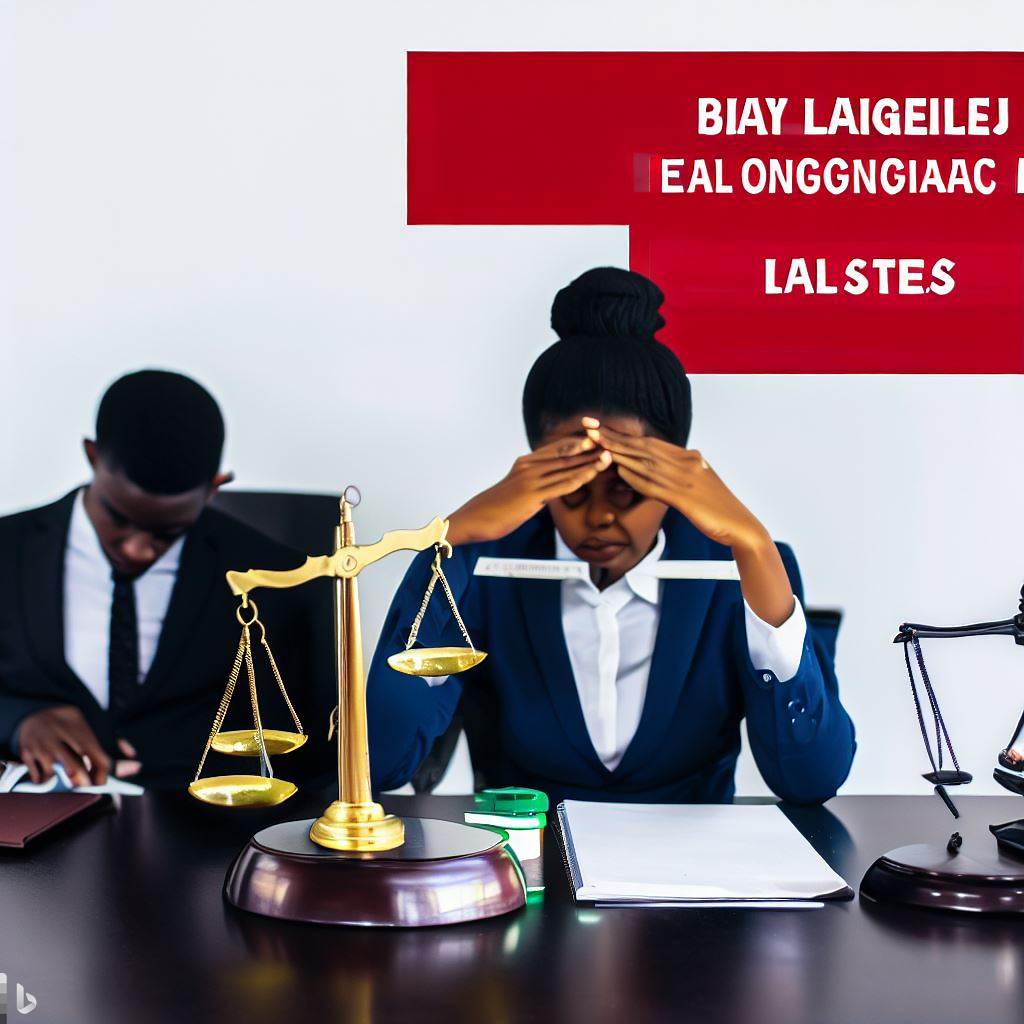Introduction
The legal profession in Nigeria has a long and rich history, dating back to colonial times. Discussing the legal challenges faced by attorneys in Nigeria is crucial for several reasons.
Attorneys play a vital role in upholding the rule of law and ensuring justice for all. They provide legal advice, represent clients in court, and assist in administering justice.
However, the legal profession in Nigeria is not without its challenges. One major challenge faced by attorneys is the slow pace of the legal system.
Cases can drag on for years, leading to delays in justice delivery and frustration for both attorneys and their clients.
Corruption is another significant issue that attorneys encounter in Nigeria.
Bribery and other forms of corruption can hinder the smooth functioning of the legal system and undermine the rule of law.
Ethical dilemmas also pose challenges for attorneys in Nigeria.
They often face difficult decisions regarding maintaining client confidentiality while also upholding their professional and ethical obligations.
Moreover, inadequate infrastructure and resources further complicate the work of attorneys.
Limited access to legal research materials, outdated court facilities, and a lack of support staff can hamper the effectiveness of their practice.
In essence, exploring the legal challenges faced by attorneys in Nigeria is vital to improving the legal profession.
Addressing these challenges will lead to a more efficient and effective legal system, ensuring justice for all.
Educational Challenges
Nigeria faces significant educational challenges that impact the legal profession and hinder the growth of competent attorneys in the country.
These challenges revolve around the lack of adequate legal education and training, limited access to updated legal resources and technology.
Also including insufficient practical experience and mentoring opportunities.
A. Lack of adequate legal education and training
Firstly, legal education institutions in Nigeria suffer from limited funding, which adversely affects the quality of education provided.
Without sufficient funds, these institutions struggle to hire qualified and experienced educators.
This results in a shortage of competent instructors capable of imparting necessary legal knowledge and skills.
Additionally, the curriculum followed by many legal education institutions is outdated and fails to equip students with the practical skills required for modern legal practice.
Nigerian attorneys often find themselves ill-prepared to handle contemporary legal issues due to the lack of emphasis on practical training.
B. Limited access to updated legal resources and technology
Access to updated legal resources and technology is also a significant challenge faced by attorneys in Nigeria.
Legal textbooks and journals can be prohibitively expensive, making it difficult for many lawyers to stay updated with legal developments.
This lack of access to timely and relevant legal information hampers the ability of attorneys to provide efficient and effective representation to their clients.
Furthermore, while online legal databases and research tools are increasingly prevalent in other jurisdictions, their availability in Nigeria remains limited.
Attorneys often struggle to find comprehensive and up-to-date legal resources online, hindering their ability to conduct thorough legal research.
Moreover, technology adoption in legal practice and court proceedings in Nigeria has been slow.
This technological lag creates inefficiencies, delays, and a lack of transparency in the legal system, adversely affecting the work of attorneys.
C. Insufficient practical experience and mentoring opportunities
Another challenge faced by attorneys in Nigeria is the lack of practical experience and mentoring opportunities.
Clinical legal education programs, which provide students with hands-on experience in legal clinics, are limited in number and scope.
This lack of practical training means that graduating lawyers often enter the profession without the necessary skills and experience required to handle real cases.
Additionally, opportunities for young lawyers to participate in moot court competitions or internships are few and far between.
These experiences are crucial for developing legal advocacy skills and gaining practical exposure to the legal profession.
Furthermore, the availability of experienced mentors who can guide young lawyers in their career development is limited.
Access to mentors who can provide guidance, support, and valuable insights is crucial for the professional growth of attorneys in Nigeria.
In general, Nigeria faces numerous educational challenges that significantly impact the legal profession.
The absence of proper legal education and training, along with restricted access to current legal resources and technology, hampers attorney skill development.
Overcoming these obstacles demands heightened funding for legal education, updated curricula, better resource accessibility, and enhanced technology integration.
Moreover, expanding practical training and mentoring initiatives will be essential in nurturing competent attorneys in the nation.
Tackling these challenges necessitates a comprehensive approach involving financial support, curriculum enhancements, technological progress, and robust training programs.
Read: Path to Becoming an Attorney in Nigeria: A Guide
Ethical and Professional Challenges
A. Corruption and bribery within the legal system
The legal profession in Nigeria faces rampant corruption and bribery, which undermines the rule of law.
Lawyers often encounter situations where judges or court officials demand bribes for favorable outcomes.
This unethical behavior weakens the credibility of the legal system and erodes public trust.
Attorneys must navigate through a corrupt environment while maintaining their integrity and commitment to justice.
Efforts to combat corruption include the establishment of professional regulatory bodies to monitor lawyers’ conduct.
However, the effectiveness of these bodies has been questioned, as some lawyers continue to engage in corrupt practices.
Stricter enforcement of ethical guidelines, transparency, and accountability are necessary to eradicate corruption in the legal system.
B. Upholding client confidentiality
Attorneys in Nigeria face challenges in maintaining client confidentiality due to inadequate legal protections.
Confidentiality is essential for establishing trust between lawyers and their clients.
However, there have been instances where lawyers have unlawfully disclosed confidential information.
This breach of trust not only harms the client but also tarnishes the reputation of the legal profession.
To address this challenge, Nigeria should adopt comprehensive laws and regulations that explicitly protect client confidentiality.
Furthermore, legal education programs should emphasize the importance of client confidentiality and ethical obligations.
Lawyers should take proactive measures, such as implementing robust data protection protocols, to safeguard client information.
C. Maintaining professionalism amidst societal pressure
Lawyers in Nigeria often face pressure from clients, family, and society to prioritize personal interests over professional standards.
These pressures can tempt lawyers to compromise their integrity and engage in unethical practices.
It is crucial for attorneys to uphold their ethical obligations regardless of societal expectations.
Professional organizations should provide support systems and guidance to help lawyers navigate these challenges.
Continuing legal education on ethics and professionalism can equip lawyers with the necessary skills to resist societal pressure.
Furthermore, fostering a culture that values integrity and professionalism within the legal community is essential for overcoming these challenges.
Lawyers should actively promote ethical behavior and hold each other accountable to maintain professional standards.
Basically, attorneys in Nigeria face various ethical and professional challenges.
They include corruption and bribery, upholding client confidentiality, and maintaining professionalism amidst societal pressure.
To address these challenges, there is a need for stronger enforcement of ethical guidelines, comprehensive laws protecting client confidentiality.
As well as supportive systems within the legal profession.
Additionally, promoting a culture of integrity and professionalism can contribute to a more ethical and trustworthy legal system in Nigeria.
Read: Impact of Nigerian Laws on the Attorney Profession

Judiciary Challenges
A. Delayed court processes and backlog of cases
The Nigerian legal system faces numerous challenges in ensuring speedy resolution of cases. One of the major problems is the delayed court processes and the subsequent backlog of cases.
This issue has plagued the judiciary for years, resulting in a significant delay in justice delivery.
The slow pace of court processes is primarily due to several factors such as inadequate infrastructure, insufficient judges, and inadequate funding.
These factors contribute to the backlog of cases, as courts struggle to handle the volume of disputes brought before them.
As a result, cases often linger in the system for years, causing frustration and impeding access to justice.
B. Inconsistency in judicial decisions and lack of precedents
Another significant issue faced by attorneys in Nigeria is the inconsistency in judicial decisions and the lack of binding precedents.
Inconsistency in judgments occurs when different judges interpret and apply the law differently in similar cases.
This lack of uniformity undermines the credibility of the judiciary and creates uncertainty in the legal landscape.
The absence of binding precedents further exacerbates the problem. Precedents serve as guiding principles for judges when deciding cases, ensuring consistency and predictability in the law.
However, in Nigeria, the limited availability and accessibility of these precedents hinder the development of a strong system of jurisprudence.
Attorneys find it challenging to anticipate outcomes and provide accurate legal advice to their clients due to the absence of binding precedents.
C. Influence of external factors in the judiciary
The influence of external factors in the judiciary poses another significant challenge for attorneys in Nigeria.
The integrity and independence of the judiciary are essential for a fair and just legal system.
However, external pressures often undermine the impartiality of judicial decisions. Corruption within the judicial system remains a major concern.
Attorneys frequently encounter situations where unethical practices, such as bribery and nepotism, influence the outcome of cases. This compromises the justice system and erodes public trust.
Political interference is another external factor that affects the judiciary.
The appointment and promotion of judges can be influenced by political considerations, undermining the merit-based selection process.
This interference undermines the independence of the judiciary and hampers its ability to dispense justice without fear or favor.
Essentially, attorneys in Nigeria face various challenges in navigating the legal landscape.
Delayed processes, inconsistent decisions, external influence impact legal system efficiency and credibility.
Publish Your Professional Profile, Business or Brand
Showcase your expertise, gain trust, and boost visibility instantly on Professions.ng.
Publish NowThese issues need to be addressed urgently to ensure timely justice delivery, consistency in legal decisions, and an independent judicial system.
Read: Law Schools in Nigeria: Where Attorneys are Made
You Might Also Like: How to Start a Successful Paralegal Career in Nigeria
Political and Socio-Economic Challenges
A. Political interference in legal cases
The legal system in Nigeria faces a significant challenge of political interference in legal cases. Politicians, in an attempt to manipulate the course of justice, often interfere in legal proceedings.
Such interference undermines the principles of fairness, impartiality, and independence of the judiciary. Political interference also affects the professionalism and ethical conduct of attorneys.
Attorneys may face pressure to compromise their integrity and independence in favor of political interests.
This interference not only undermines the legal profession but also erodes public trust in the judiciary.
To address this challenge, reforms are needed to protect the independence of the judiciary from political influence.
Efforts must be made to ensure that legal cases are handled based on merit rather than political considerations.
Transparency and accountability in the legal system will help to restore public confidence in the profession.
Stakeholders, including the legal community, civil society organizations, and the government, must collaborate to address this issue.
B. Society’s perception and distrust of the legal profession
The legal profession in Nigeria faces a significant challenge of society’s perception and distrust.
Many citizens view lawyers and attorneys with suspicion and mistrust. This perception is partly due to negative experiences with lawyers and reports of unethical practices.
Lawyers are often seen as opportunistic, corrupt, and more interested in personal gains rather than justice. Such perception undermines the credibility and legitimacy of the legal profession.
Addressing this challenge requires a collective effort from both the legal profession and society.
Lawyers must adhere to the highest ethical standards and actively promote transparency and accountability.
Educational campaigns and awareness programs can help educate the public about the role and importance of the legal profession.
Engaging with community organizations and fostering dialogue can help build trust and change societal perceptions.
Building a strong and ethical legal profession will ultimately contribute to a more just and fair society.
C. Low pay and financial struggles for attorneys
A significant challenge faced by attorneys in Nigeria is the issue of low pay and financial struggles.
The majority of attorneys in Nigeria do not earn adequate salaries to sustain a decent standard of living.
This low pay often leads to financial struggles and can compromise the quality of legal services.
Attorneys may be forced to take on excessive caseloads to make ends meet, resulting in compromised representation.
Low pay also discourages young, talented individuals from pursuing a career in law. To address this challenge, it is crucial to advocate for fair and competitive compensation for attorneys.
Government and legal associations should work collaboratively to establish minimum wage standards for the legal profession.
Efforts should also be made to improve the efficiency of the legal system to reduce the burden on attorneys.
Providing financial support, such as grants and loan programs, can enable young lawyers to establish their practices.
Adequate compensation and support will help attract and retain talented lawyers, ensuring a competent legal profession.
In short, attorneys in Nigeria face various political and socio-economic challenges that hinder their ability to provide effective legal representation and contribute to a just society.
These challenges include political interference in legal cases, society’s perception and distrust of the legal profession, and low pay and financial struggles for attorneys.
Addressing these challenges requires reforms to protect the independence of the judiciary, build trust with society, and advocate for fair compensation for attorneys.
A concerted effort from stakeholders is necessary to overcome these challenges and ensure a robust legal system in Nigeria.
Read: Day in the Life of a Nigerian Attorney: An Insight
Access to Justice Challenges
A. Limited access to legal representation for the underprivileged
Due to financial constraints, many underprivileged individuals struggle to obtain legal representation.
The cost of hiring a lawyer is often prohibitively high, making access to justice difficult for them. This limited access to representation hinders their ability to navigate the legal system effectively.
As a result, the underprivileged face unequal treatment and cannot exercise their rights.
B. Complexity and cost involved in pursuing legal cases
The legal process in Nigeria is often complex and lengthy, involving various procedures and documentation.
Understanding and complying with these complexities can be daunting for both lawyers and their clients.
Additionally, the expenses incurred during the legal process, such as filing fees and expert fees, can be burdensome.
These challenges make pursuing legal cases costly, discouraging individuals from seeking justice.
C. Inadequate court infrastructure and facilities
Nigerian courts often suffer from a lack of proper infrastructure and facilities.
Insufficient courtrooms, limited seating, and outdated technology hinder the smooth functioning of the justice system.
This inadequacy leads to delays in court proceedings and negatively affects the administration of justice.
Parties involved in legal cases are affected by the slow progress and prolonged waiting times.
Additionally, the absence of modern facilities diminishes the efficiency and effectiveness of the legal process.
In fact, attorneys in Nigeria face numerous access to justice challenges that hinder their ability to provide equitable legal representation.
Limited access to legal representation for the underprivileged creates a gap in the justice system, preventing equal treatment under the law.
The complexity and cost involved in pursuing legal cases further exacerbate the situation, deterring individuals from seeking justice.
Additionally, inadequate court infrastructure and facilities contribute to delays in court proceedings, adversely impacting the administration of justice.
To ensure a fair legal system, it is crucial to address these challenges and strive for improved access to justice for all Nigerian citizens.
Delve into the Subject: Emerging Trends: Entertainment Law in Nigeria’s Film Sector
Conclusion
Attorneys in Nigeria contend with several challenges, including the sluggish legal system resulting in prolonged cases and frustration.
Corruption poses a significant hindrance, undermining the rule of law, while ethical quandaries and inadequate resources further complicate their work.
Reforms aimed at overcoming these challenges in Nigeria’s legal landscape need to be looked into as they are crucial to the fair and just legal system in Nigeria.




